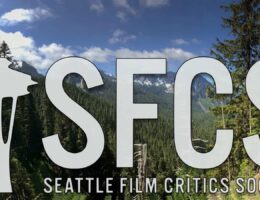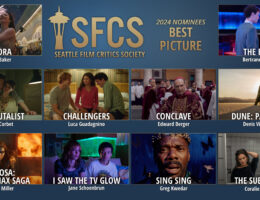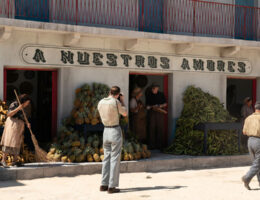We’ve had a very busy eleven days covering this year’s first-ever virtual Seattle International Film Festival with roundtables and reviews of the bounty of cinema brought to our homes by technology and the tireless programmers and organizers. On Sunday night SIFF handed out awards and closed the festival with Catalan dramedy Rosa’s Wedding. Since then, the SunBreak’s SIFF Squad virtually assembled to chat about our experience with this year’s event and to rehash some of our festival favorites.
We don’t have those paper ballots that are hallmark of the in-person SIFF viewing experience; so on the way out of the virtual theater please give your rating for SIFF 2021.
Josh: ☆☆☆☆☆ for SIFF’s effort and execution, ☆☆☆ for my own ability to fully dig in enjoy it the programming to its fullest. Honestly, this was more about my own headspace surrounding virtual festivals, particularly after more than a year of them.
Jenn: ☆☆☆☆☆, A+ festival in my book. I personally watched over 50 films from over 30 countries without so much as a hiccup – SIFF really figured this one out.
Chris: A nice festival that felt way too short for SIFF. While I lost valuable time for pandemic reasons I didn’t plan for (side effects from the second vaccine shot cost me about three days of SIFF total), I ended up seeing eight films in basically eight days.
Morgen: After experiencing several virtual film festivals, I think SIFF has far outdone all the others. Maybe they had more time to find out what does and doesn’t work, but either way they found the sweet spot.
Tony: Ironically enough, I thought the shorter format would make things easier, but a very full week and weekend snatched away a lot of my viewing time. Let it be stated for the record that I shall never complain about the length of the IRL Seattle International Film Festival, ever again (not that I think I ever have, but…).
Josh: We keep going on about how this year’s virtual event was so abbreviated. For context to the uninitiated, in-person SIFFs typically stretch to nearly a month for regular festival goers (which is already very long for a film festival). But The Full SIFF experience is even longer for the Passholder Privileged among us thanks to additional weeks of press (plus a lot of passholder) screenings in advance of Opening Night. For what it’s worth, I think that the length of this year’s “abbreviated” schedule is much healthier even though it may have taken some mental reconfiguration for audiences accustomed to Marathon SIFFs to adapt.
Jenn: True, although a remarkable thing about SIFF is not just its length but its volume, and this year’s fest abbreviated its length much more than its volume. So while with all that extra time, the super dedicated can actually watch every single film in the festival if they really want to, this year that was literally impossible unless you could watch 9 films per day. (Which I did….one day.)
Josh: That’s incredible! Although we don’t hand out trophies amongst ourselves, I don’t think anyone can come close to that in terms of filmgoing enthusiasm and endurance!
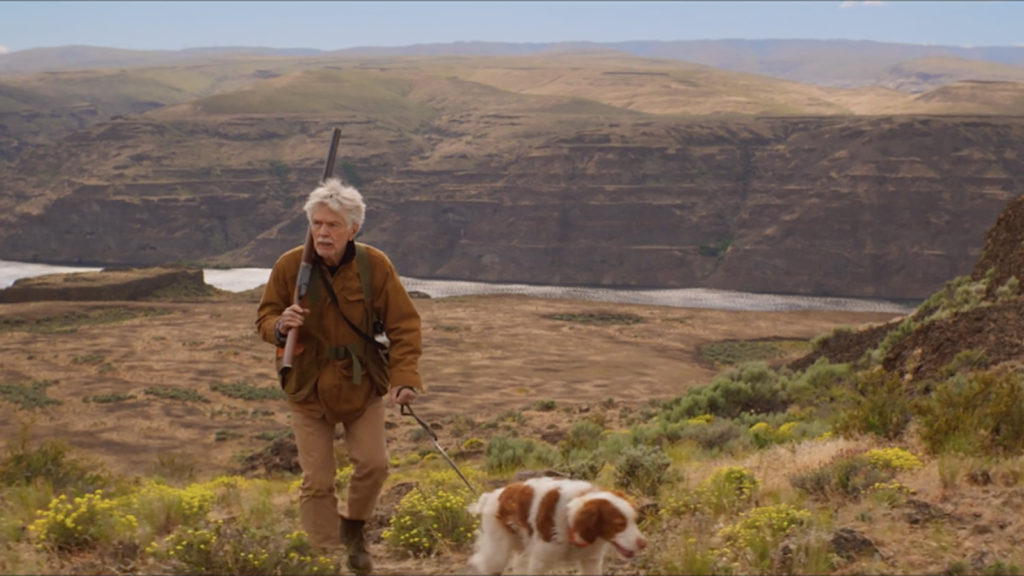
Let’s get into it: the Still-Virtual Golden SunBreak Awards. What’s your pick for Best Narrative Feature?
Chris: I really loved East of the Mountains an awful lot. I was correct that it ended up being my favorite movie by the end of SIFF. I didn’t see anywhere near as many movies as I would’ve liked. I was also very fond of Sweat for reasons I’ll explain below.
Josh: With my self-imposed challenge of catching as many of the Documentary and Official Competition slates as possible, I ended up seeing way more documentaries and didn’t get a lot of depth for narrative features this year. With that caveat in mind, I guess I’ll agree with the wisdom of crowds that crowned There Is No Evil the winner of the Golden Space Needle. Like the majority of SIFF voters, it was my highest ranked narrative, too.
Tony: Josh, I was much more fortunate than you, and chose pretty well, all told. At the risk of being one of Those People, I’m going to fudge and register a tie. East of the Mountains was elegiac and resonant–a quietly brilliant, reflective drama that really hit me in the feels. That said, the romantic oddball in me really, really took to Alan Birney’s and Kentucker Audley’s romantically oddball sci-fi sorta-love story, Strawberry Mansion. And there are at least one or two runners-up for me, to boot.
Jenn: Weirdos doing goofy stuff with lo-fi mostly-practical effects and a lot of heart is pretty much always my thing, so Strawberry Mansion, Too Late, Wyrm, and This Town are all high on the list of fest favorites for me. It’s super hard to choose a favorite amongst those (honestly this is a multiple-ways tie), so I guess gun to my head I’ll just stick with the one I’ve been crowing about since opening weekend: Mogul Mowgli.
Morgen: Funny enough, the very last film I managed to watch became the most memorable feature. I saw a lot of works that made me laugh and brought me a lot of joy, but 200 Meters was gut-wrenching and surprising in its boldness and revealed a way of life that’s painful in its normalcy for those that live it.
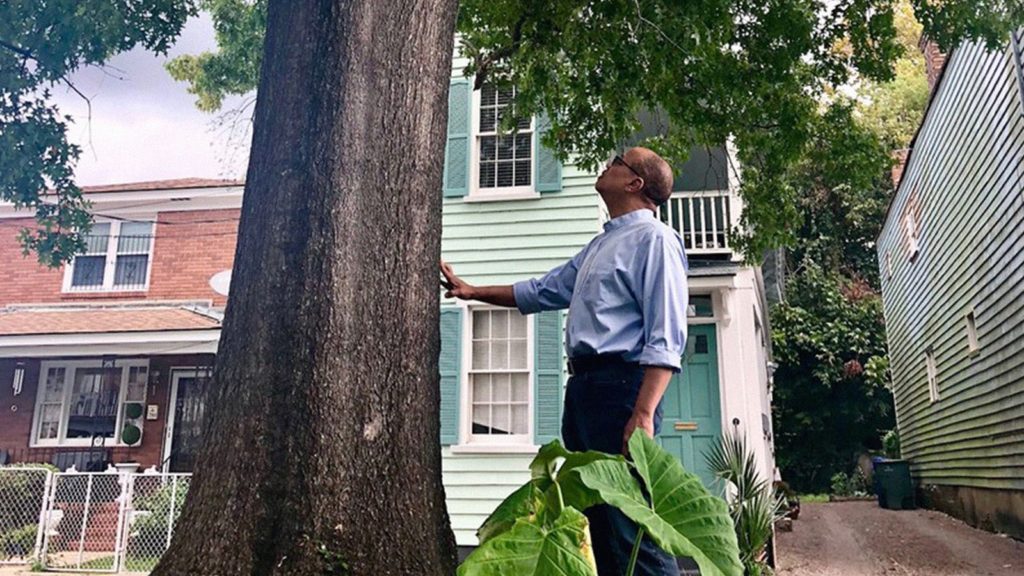
And the Golden SunBreak for Best Documentary Feature goes to …
Josh: I saw a lot of decent documentaries at this year’s festival, but Captains of Za’atari easily takes the prize for me. I might have liked slightly more exposition, but it managed to be both an effective sports documentary while also humanizing the Syrian refugee crisis. The beautiful scene of two best friends sneaking out of their fancy hotel room at night for the simple thrill of kicking a ball around barefoot on a grass pitch after years of playing on dusty fields will stick with me for a long while.
Jenn: I gravitate toward narrative features, but I did watch ten docs this fest (plus several more that are arguable, like experimental/narrative-doc hybrids). Although Youth v Gov was a major runner-up for me, Who We Are: A Chronicle of Racism in America is the clear best doc of this fest as far as I’m concerned. It’s essential viewing. I sincerely hope every American (and more) sees it.
Morgen: I wasn’t able to watch many documentaries (focusing on shorts for the most part) but Who We Are: A Chronicle of Racism in America is the winner for me. In all the allyship work I’ve been doing over the past several years, I learned a lot of the information this film revealed, but it is a well-crafted story and personal experiences from the protagonist made it all the more powerful.
Chris: I think I might pass here. I didn’t see as many docs as I usually do, so I don’t have a good read on the documentary program. Street Gang was flawed because it had a subject with such a rich history that it couldn’t possibly cover what it needed to cover in 107 minutes. Super Frenchie was cool but wasn’t at a level you would consider “best documentary at a film festival” material. Truman and Tennessee had a voiceover of Jim Parsons’ unbearable Truman Capote impersonation. I don’t understand what he was going for, especially when you hear Capote’s actual voice from video footage from talk show appearances that are interspersed throughout the movie!
Tony: I didn’t get to nearly as many docs as I’d have liked, but I definitely side with SIFF audiences and choose the Golden Space Needle-winning Who We Are: A Chronicle of Racism in America. Chris, you’re on-point with your assessment of Street Gang, though I think I may have liked it more than you. And I enjoyed Truman and Tennessee as the solid if formulaic documentary that it was. Ironically enough, I had a lot less of an issue with Jim Parsons’ vocal performance as Capote: The real guy’s voice is distinctively cartoonish and (sorry) irritating, so Parsons’ vocal reading distracted a lot less from the eloquent words being spoken than Capote’s actual nasal drawl did.

Special Mentions for Best Performances:
Josh: Under the Open Sky gets lost in extraneous subplots and doesn’t fully know where it’s going, but Yakusho Kōji makes the most of (possibly too much) from the lead role as a ex-convict trying to live on the right side of the law.
Jenn: Similar to Josh’s thoughts, I found the Taiwanese film The Teacher to have some fundamental flaws, but Oscar Chiu’s lead performance was nevertheless a major standout. His character of Kevin (the titular teacher) is so gentle and sweet and, above all, naïve – with no guile at all, you see every little thought passing across this guy’s face. A scene where he just has to listen and take it while his colleagues sit around him debating his standing in the workplace is a masterclass.
Chris: There were two performances I loved for very different reasons that I don’t think got enough attention. The first is Magdalena Kolesnik in Sweat, a Polish movie about the public persona and private life of an influencer. It’s a richly nuanced performance about someone who lives much of their life online but has to deal with the extreme highs and lows of such a career path. Kolesnik is flawless in that role. I also really loved Luis Deveze in All Sorts for his comedic performance. He was just so offbeat and ridiculous as a boss of a data company who didn’t really understand, well, much of anything. He took the clueless boss stereotype to its most absurd extension and the results were hilarious
Morgen: The two leads, Yoran Leicher and Sobhi Awad in Too Far Away, were simply outstanding. The story of a friendship between a German boy forced to move to the city with his family and a Syrian boy ripped from his to move to a safer place. The depth of emotion each one portrayed at such a young age was really impressive and completely engrossing. I even realized it while I was watching; most of the time I only notice something like that after thinking back on a film I’ve already seen.
Tony: My best-performance of SIFF 2021 is undoubtedly Zorica Nusheva’s great work in Teona Strugar Mitevska’s dramedy, God Exists, Her Name is Petrunija. Nusheva navigates her character’s arc of discovery with nuance and deeply affecting emotional weight. She’s funny, charming in a wonderfully un-Hollywood way, and absolutely riveting to watch, without ever seeming like she’s even trying to be. I was floored.
SIFF’s juries and audiences have spoken …
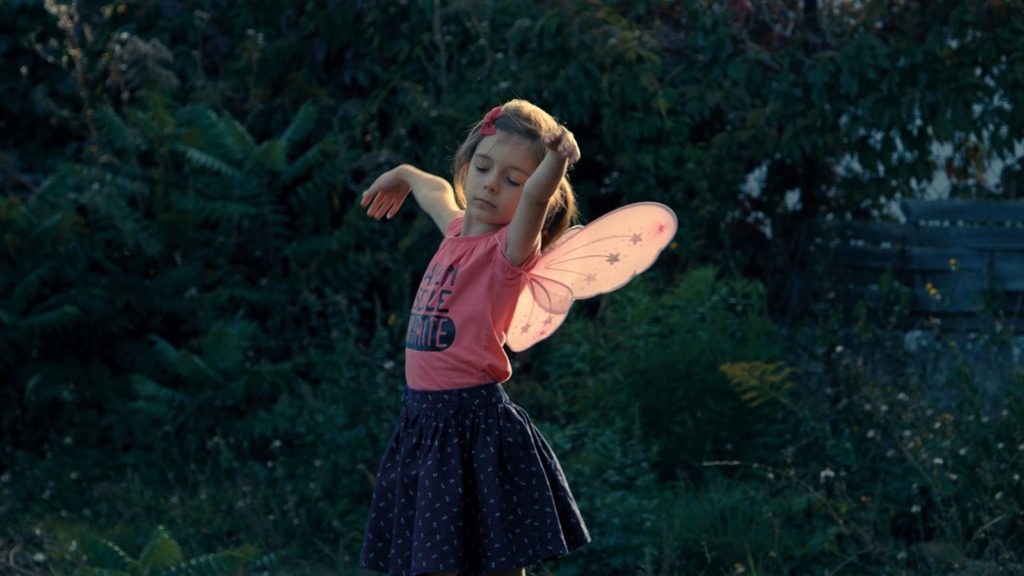
Jury Awards
- Official Competition:
Little Girl (Sébastien Lifshitz) - Documentary:
The Earth is Blue as an Orange (Iryna Tsilyk) - New Directors:
This Is My Desire (Arie Esiri & Chuko Esiri) - New American Cinema:
Son of Monarchs (Alexis Gambis) - Ibero-American:
Fly So Far (Celina Escher) - Films4Families:
The Legend of Hei (MTJJ) - FutureWave:
Summertime (Carlos López Estrada)
Audience Awards
Narratives
- There Is No Evil (Mohammad Rasoulof)
- Under the Open Sky (Miwa Nishikawa)
- Riders of Justice (Anders Thomas Jensen)
- Potato Dreams of America (Wes Hurley)
- When Hitler Stole Pink Rabbit (Caroline Link)
Documentary
- Who We Are: A Chronicle of Racism in America (Sarah Kunstler & Emily Kunstler)
- Street Gang: How We Got to Sesame Street (Marilyn Agrelo)
- Youth v Gov (Christi Cooper)
- Writing With Fire (Rintu Thomas & Sushmit Ghosh)
- Little Girl (Sébastien Lifshitz)
Josh: I’m not at all surprised by the Grand Jury awards from the Official and Documentary competitions. Both winners were documentaries that took unique approaches to bringing their subjects to audiences on their own terms. In one case a closely-observed but unobtrusive study of a French family affirming their daughter’s fundamental right to full self-expression, the other a lyrically unconventional portrait of burgeoning Ukrainian filmmakers on the edge of a war zone.
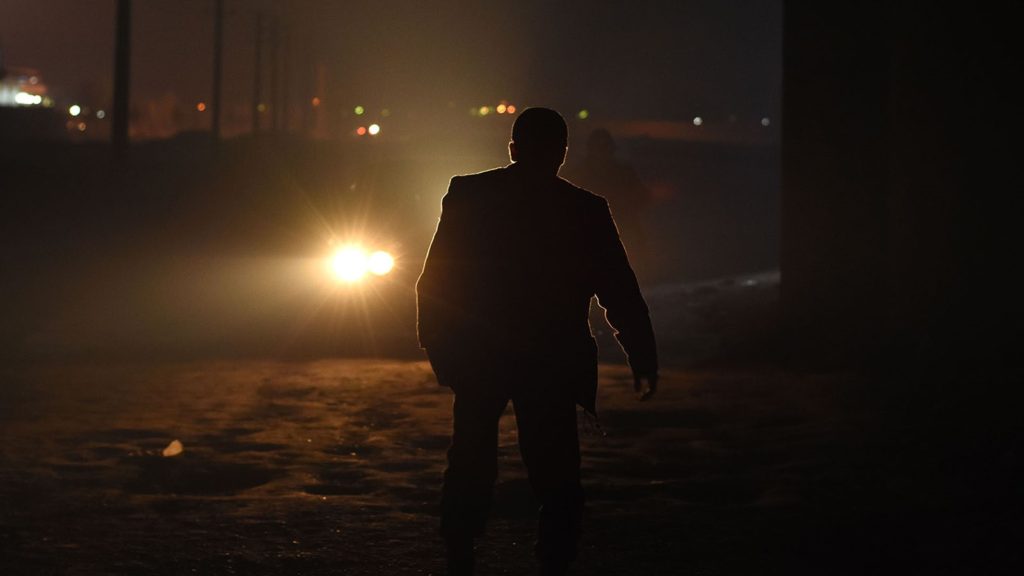
Josh: On the other hand, SIFF audiences often go with a crowd-pleaser, so I have to admit to being pleasantly surprised at this year’s Golden Space Needle Awards. In particular, I’m impressed that There Is No Evil, Mohammad Rasoulof’s interlocking jewel-box anthology of short stories about capital punishment in Iran, took top prize. It’s description was a tough sell, but it was an unexpected take on a challenging subject.
Most of us have already gushed about Who We Are: A Chronicle of Racism in America in this and the previous roundtable; so it’s great to see this challenging material rewarded as the Golden Space Needle for Documentary. Aside from being an engaging film, Jeffery Robinson being a longtime Seattle resident may have given this vital exploration of highly relevant truths the boost it needed to claim the Needle in what sounded like a very competitive race.
Jenn: None of these except for Who We Are are my personal favorites in their categories, but there’s nothing I specifically object to either. I agree that There Is No Evil is a much more daring choice than the usually sorta middle-of-the-road selections audiences tend to lean toward, so that’s great. 21 films were singled out for live Q&As during the fest (which were a primary outlet for audience participation/social interaction – did anybody go into Gather after that initial preview night?), and 7 of them are featured in this list. Wonder if that’s a coincidence.
Morgen: I don’t know how this happens but I always end up missing a majority of the films that win these awards. I manage to see one or two, and Who We Are… is one of those this time. It’s award is well-deserved and I’m very glad that the audience at large agrees. I also caught The Legend of Hei. A delightful anime-style animated film that was unique up to a point, but I’ll be honest… it needed a bit more editing. Parts of it were a little confusing and transitions were a bit choppy. If I were to pick my favorite animated film from SIFF, it would have been Nahuel & the Magic Book instead. Another unique story that really took me on a journey. It is fantastic for a younger audience but it didn’t make “grownup jokes” just so parents were entertained. It dealt with real issues without speaking down to kids and I really enjoyed it from beginning to end.
Tony: I’m gonna just join the chorus of huzzahs that have ballyhooed Who We Are. In addition to its absorbing, intelligent, and incredibly emotional content, traversing the ongoing odyssey of systemic racism through Robinson’s eyes stands as a prime example of how powerful the documentary format can be when the presentation is equal to the content within.
Josh: I know that a few of us might still have a review or two to post, but as it stands we collectively reviewed a solid chunk of the feature film programming (counting the mentions in this roundtable, we’re at about half); so let’s call this roundtable a wrap and put in one more plug to Keep up with the rest of our festival coverage via our SIFF 2021 tag and handy index of all SIFF 2021 reviews and roundtables.
